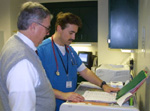Social Work Month: Preserving Rights, Strengthening Voices
by Gale Horinbein, MSW, LISWMedical Social Worker
Each March, the National Association of Social Workers (NASW) celebrates the work of more than half a million social workers during National Professional Social Work Month. Officially established in 1984 by President Ronald Reagan to honor our nation’s social workers, the NASW uses this month as a time to kick off a yearlong public service campaign to raise awareness about the social work profession and to promote critical social issues.
 Manager
of Medical Social Work, Sheldon Weinstein, left, and nurse Michael Donovan
review a patient’s chart.
Manager
of Medical Social Work, Sheldon Weinstein, left, and nurse Michael Donovan
review a patient’s chart.
The theme for the 2003 campaign, “ The Power of Social Work: Preserving Rights, Strengthening Voices,” focuses on an essential tenet of social work practice- working to empower those who are frequently unheard. As this year marks the 20th annual (official) celebration of the social work profession, NASW chose a theme that underscores the commitment social workers make in improving communities through legislative advocacy, service delivery, research, and education. It recognizes their dedication to children’s rights, civil rights, disability rights, lesbian and gay rights, crime victim’s rights, labor rights, human rights, patient’s rights, women’s rights, among many others.
According to Terry Mizrahi, Ph.D., MSW, president of the NASW, “A primary goal of social work is to protect people’s rights and to enable individuals to achieve success on their own terms.”
Whether they work in direct practice, administration, education and research, or policy development, professional social workers are trained to make an impact. They help people think about solutions to their problems and overcome some of life’s most difficult challenges- poverty, discrimination, abuse, addiction, physical illness, divorce, loss, unemployment, educational problems, disability and mental illness.
Social workers help people take charge of their lives by helping them navigate complex social systems. They connect individuals and families to appropriate resources; help people understand and use their strengths to cope with life’s adversaries; and shape programs and policies that contribute to healthy and successful communities.
Social workers are found in every facet of community life- in schools, hospitals, mental health clinics, senior centers, elected office, private practices, prisons, military, corporations, and in numerous public/private agencies that serve individuals and families in need.
Only those who have earned social work degrees at the bachelor’s, master’s or doctoral levels and completed a minimum number of hours in a supervised fieldwork are “professional social workers.” To work as a social worker in South Carolina, you must be licensed by the Labor, Licensing and Regulation’s Board of Social Work Examiners and to obtain that license, you must fulfill the educational requirements and pass an exam.
Regardless of context or specialty, social work is a profession aimed at helping people address their problems, matching them with the resources they need to lead productive lives and expanding choices and opportunities for all people, with special regard for vulnerable and disadvantaged individuals and groups. National Professional Social Work Month highlights this vital work and the contributions social workers make in helping our communities become safer, better places.
For more information on social work, contact Inpatient Social Work at 792-0617, Outpatient Social Work at 876-0587 or IOP Social Work at 792- 9888.
Social Worker’s Profile:
What can you do in your role as a social worker to be a better voice/advocate
for your patients?
“As an advocate for patients and families, it
is important to listen and allow the families to open up, and have a clear
understanding of the different needs of the patient.”
 —Denise
Prentice, MSW, LISW
—Denise
Prentice, MSW, LISW
Medical Social Worker Children’s Hospital
“I believe that patients need to be their own
advocates. I encourage them to have their own voice and to be independent
to make it through the transplant process.”
 —Tracy
Mau, MSW, ACSW, LISW Clinical Social Worker Ambulatory Care Services
—Tracy
Mau, MSW, ACSW, LISW Clinical Social Worker Ambulatory Care Services
“Everything we do is in advocacy for the patients.
When patients are diagnosed with cancer, it is hard for them to have their
own voice. We are their problem solvers, giving them the support and information
they need to help themselves.”
 —Elena
Bell, UMA
—Elena
Bell, UMA
Social Worker, HCC
“A lot of families we work with have single mothers
or care givers. We empower the caregiver and support them in learning new
strategies to find better situations for the child.”
 —Irene
Dorsey, LISW
—Irene
Dorsey, LISW
Family Therapist Social Worker,
North Star Program, IOP
Social Work History
- Social work pioneer Jane Addams was one of the first women to receive a Nobel Peace Prize, which was awarded in 1931. Known best for establishing settlement houses in Chicago for immigrants in the early 1900s, Addams was a dedicated community organizer and peace activist.
- Today, Americans enjoy many privileges because early social workers saw miseries and injustices and took action, inspiring others along the way. Many of the benefits we take for granted came about because of social workers—working with families and institutions—spoke out against abuse and neglect.
Catalyst Online is published weekly, updated as
needed and improved from time to time by the MUSC Office of Public Relations
for the faculty, employees and students of the Medical University of South
Carolina. Catalyst Online editor, Kim Draughn, can be reached at 792-4107
or by email, catalyst@musc.edu. Editorial copy can be submitted to Catalyst
Online and to The Catalyst in print by fax, 792-6723, or by email to petersnd@musc.edu
or catalyst@musc.edu. To place an ad in The Catalyst hardcopy, call Community
Press at 849-1778.